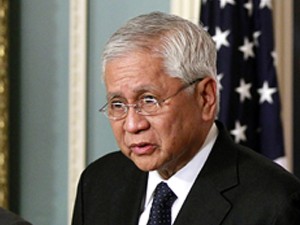MANILA, Philippines—The Philippines is considering the pullout of its 300 peacekeepers from the Golan Heights because of security concerns, following the abduction of four Filipino troops by Syrian rebels, Foreign Secretary Albert del Rosario said on Friday.
“The abductions have already happened twice. We don’t want to expose our people any further any more than we need to. We should have an early pullout from Golan Heights,” Del Rosario told a forum organized by the Foreign Correspondents Association of the Philippines in Makati City.
Del Rosario said he would make the recommendation to pull out the Filipino troops from the United Nations (UN) peacekeeping force in the Golan Heights to President Aquino, who will make the final decision.
“As soon as he (Aquino) says go, we will undertake to do that. As soon as possible,” Del Rosario said.
“We have served with dedication in that area but because of the changed circumstances, our recommendation would encompass an early pullout of our people there because we believe that exposure now is beyond tolerable limits,” he added.
Presidential spokesperson Ricky Carandang said Mr. Aquino was considering the recommendation and Del Rosario’s fears about the peacekeepers’ safety were valid, although no decision on a withdrawal had been made.
“This is the second time this has happened so there are legitimate concerns about the safety of our peacekeepers,” Carandang said in a text message to AFP when asked to comment on Del Rosario’s recommendation.
On Tuesday, Syrian rebels from a group calling itself as the “Yarmuk Martyrs Brigade” seized the four Filipino soldiers at an observation post in the Al Jamlah zone, two months after 21 Filipino troops were also abducted by the rebels and held for four days.
The Syrian rebel group has said it was holding the peacekeepers “for their own safety.”
The Filipino peacekeepers have been serving under the UN Disengagement Observer Force (UNDOF) which has been deployed at a demilitarized area in the 1,200 square kilometers Israeli-occupied territory since 1974.
Israel captured the Golan Heights during the Yom Kippur War. The UN later brokered a ceasefire between Syria and Israel and set up the UNDOF to monitor the ceasefire agreement.
“The people that abducted our peacekeepers were actually under siege and they are using our people to get themselves out of the situation they find themselves in. That thing is not for us,” Del Rosario said.
He said that normally, a peacekeeper-sending state needed to inform the UN three months in advance before pulling out from the mission.
“But under the circumstances, where people are in jeopardy, obviously our people are in jeopardy, we may try to get the UN to release them earlier if that is possible,” he said.
The UNDOF has about 1,000 peacekeepers and civilian staff from the Philippines, Austria, India, Morocco and Moldova.
Del Rosario said there were about 340 Filipino troops in the UN peacekeeping force. Mostly of them are from the Philippine Army.
On Wednesday, the UN pulled all peacekeepers out of the observation post in the Al Jamlah zone where the four Filipinos were abducted.
“In light of the evolving security situation, peacekeepers from that position have been relocated,” UN spokesperson Martin Nesirky said.
“(The UNDOF is) operating in an extremely dangerous and unusual environment,” Nesirky said, adding that there were no indications the rebels had harmed the abducted Filipinos.
“Efforts are still under way to secure their release,” he said.
Del Rosario said he had no updates on the negotiations with the rebels.
Philippine military spokesman Brig. Gen. Domingo Tutaan said on Friday that UN peacekeepers had been in “continuous talks” with the hostage takers, but gave no details on the negotiations. With reports from AFP
